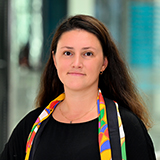START YOUR JOURNEY NOW
Overview
The goal of the Doctor of Philosophy in Natural Language Processing is to produce highly trained researchers for industry and academia. The program prepares students to apply the research techniques and knowledge they have gained to solve complex problems in the field of natural language processing (NLP) and artificial intelligence (AI).
NLP focuses on system development that allows computers to communicate with people using everyday language. Natural language generation systems convert information from the computer database into readable or audible human language and vice versa. Such systems also enable sophisticated tasks such as inter-language translation, semantic understanding, text summarization, and holding a dialog. The key applications of NLP algorithms include interactive voice response applications, automated translators, digital personal assistants (e.g., Siri, Cortana, Alexa), chatbots, and smart word processors.
-
Mode: Full-time
-
60 credits
-
Location: On campus
As we look to the future, our department at MBZUAI will continue to be a driving force in shaping the next generation of NLP technologies. Whether it’s in the realms of large language models (LLMs), dialog systems, chatbots, Arabic NLP, machine translation, speech recognition, multimodality (language +speech/images/video), or understanding the subtleties of language, our department will be at the forefront of innovation.
Preslav Nakov
Department Chair of Natural Language Processing, and Professor of Natural Language Processing
Read BioMeet the faculty
National Qualifications Framework – three strands
The program learning outcomes (PLOs) are aligned with the Emirates Qualifications Framework and, as such, are divided into the following learning outcomes strands: knowledge (K), skills (S), and responsibility (R).
Program learning outcomes
Upon completion of the program requirements, graduates will be able to:
- PLO 01: Devise cutting-edge NLP algorithms with applications to real-life.
- PLO 02: Implement, evaluate, and benchmark existing state-of-the-art in NLP scholarly publications.
- PLO 03: Identify open research problems, and the gaps in the existing body of knowledge, to formulate high impact research questions.
- PLO 04: Independently develop innovative solutions, through extensive research and scholarship, to resolve unsolved research problems in high-impact real-life applications of NLP.
- PLO 05: Invent innovative, sustainable, and entrepreneurial state-of-the-art solutions to existing open research problems.
- PLO 06: Pursue an NLP project either independently, or as part of a team in a collegial manner, with minimal supervision.
- PLO 07: Initiate, manage, and complete research manuscripts that demonstrate expert self-evaluation and advanced skills in scientifically communicating highly complex ideas.
- PLO 08: Initiate, manage, and complete multiple project reports and critiques, on a variety of NLP problems.
The PLOs are mapped to the National Qualifications Framework Level Eight (8) qualification and categorized into three domains (knowledge, skill, and Responsibility) as per the National Qualifications Framework set by the UAE National Qualifications Centre (NQC) and the Ministry of Higher Education and Scientific Research (MoHESR):
[wps_table style=”default”]
| PLOs | Knowledge | Skill | Responsibility |
|---|---|---|---|
| PLO 01 | – | S | R |
| PLO 02 | K | S | – |
| PLO 03 | K | S | – |
| PLO 04 | K | S | R |
| PLO 05 | K | S | R |
| PLO 06 | – | – | R |
| PLO 07 | K | S | – |
| PLO 08 | – | – | R |
[/wps_table]
The minimum degree requirements for the Doctor of Philosophy in Natural Language Processing is 60 credits, distributed as follows:
| Number of courses | Credit hours | |
|---|---|---|
| Core | 3 | 8 |
| Electives | At least four dependent on credit hours | 16 |
| Internship | At least one internship of a minimum of three months duration must be satisfactorily completed as a graduation requirement | 2 |
| Advanced research methods | 1 | 2 |
| Research thesis | 1 | 32 |
| Total | 10 | 60 |
Core course: A required course that all students in the program must take because it teaches the essential knowledge and skills for the degree.
Elective course: A course chosen based on the student’s interest or research topic. It allows the student to explore topics outside the required core courses.
Prerequisite: A course that must be successfully completed before taking another course, because it provides the background knowledge the student needs.
Co-requisite: A course the student must take at the same time as another course, because the two subjects support each other.
Anti-requisite: A course that the student is not allowed to take if they have already taken another specific course, because the content overlaps too much.
The Doctor of Philosophy in Natural Language Processing is primarily a research-based degree. The purpose of coursework is to equip students with the correct skill set, enabling them to complete their research project (thesis) successfully. Students are required to take core courses as mandatory courses. To accommodate a diverse group of students, coming from different academic backgrounds, students have been provided with flexibility in course selection.
The decision on the courses to be taken will be made in consultation with the students’ supervisory panel, which will comprise of two or more faculty members. Essentially, the student’s supervisory panel will help design a personalized coursework plan for each individual student, by looking at their prior academic track record and experience, and the planned research project.
All students must take the following core courses:
| Code | Course title | Credit hours |
|---|---|---|
| INT899 |
Ph.D. Internship
Assumed knowledge: Prior to undertaking an internship opportunity, students must have successfully completed 24 credit hours. Course description: The MBZUAI internship with industry is intended to provide the student with hands-on experience, blending practical experiences with academic learning. |
2 |
| NLP805 |
Natural Language Processing - Ph.D.
Assumed knowledge: Understanding of calculus, algebra, and probability and statistics. Programming in Python or similar language. Antirequisite course/s: NLP701 Natural Language Processing Course description: This course focuses on recent research in natural language processing (NLP) and on developing skills for performing research to advance the state–of–the–art in NLP. |
4 |
| NLP899 |
Natural Language Processing Ph.D. Research Thesis
Assumed knowledge: Course work plus a pass in the qualifying exam. Course description: Ph.D. thesis research exposes students to cutting-edge and unsolved research problems, where they are required to propose new solutions and significantly contribute towards the body of knowledge. Students pursue an independent research study, under the guidance of a supervisory panel, for a period of three (3) to four (4) years. Ph.D. thesis research helps train graduates to become leaders in their chosen area of research through partly supervised study, eventually transforming them into researchers who can work independently or interdependently to carry out cutting edge research. |
32 |
| RES899 |
Advanced Research Methods
Course description: This course will prepare students to produce professional-quality academic research and solve practical research challenges based on innovative and ethical research principles. This course will provide exposure to a variety of research topics related to AI, research integrity, AI ethics, and organizational challenges. Students will learn to assess their own research projects and scrutinize the research methods and metrics used in their research and critically examine the ethical implications of their work. They will learn about the peer-reviewing process, participate in reviewing their classmates’ work, and learn best-practice for oral and written presentation of research. After completing the course, students will have the skills to develop a research methodology and conduct research that is rigorous and ethical. |
2 |
| Select one course from NLP806 or NLP807: |
Assumed knowledge: Understanding of calculus, algebra, and probability and statistics. Programming in Python or a similar programming language. Course description: This course provides a comprehensive introduction to speech processing. It focuses on developing knowledge about the state of the art in a wide range of speech processing tasks, and readiness for performing research to advance the state of the art in these topics. Topics include speech production, speech signal analysis, automatic speech recognition, speech synthesis, neural speech recognition and synthesis, and recent topics in foundation models and speech processing. |
|
| NLP806 |
Advanced Natural Language Processing - Ph.D.
Assumed knowledge: Understanding of calculus, algebra, and probability and statistics. Programming in Python or similar language. Course description: This course focuses on recent topics in natural language processing (NLP) and on developing skills for performing research to advance the state–of–the–art in NLP. Specifically, this course will cover fundamentals of LLMs such as transformers architecture, methods on training and evaluating LLMs via distributed training and efficiency methods, and application in multilinguality, translation, and multimodality. |
4 |
| NLP807 |
Speech Processing - Ph.D.
Assumed knowledge: Understanding of calculus, algebra, and probability and statistics. Programming in Python or a similar programming language. Course description: This course provides a comprehensive introduction to speech processing. It focuses on developing knowledge about the state of the art in a wide range of speech processing tasks, and readiness for performing research to advance the state of the art in these topics. Topics include speech production, speech signal analysis, automatic speech recognition, speech synthesis, neural speech recognition and synthesis, and recent topics in foundation models and speech processing. |
4 |
The Ph.D. research thesis exposes students to cutting-edge and unsolved research problems in the field of computer vision, where they are required to propose new solutions and significantly contribute to the body of knowledge. Students pursue an independent research study, under the guidance of a supervisory panel, for a period of three (3) to four (4) years.
| Code | Course title | Credit hours |
|---|---|---|
| NLP899 |
Natural Language Processing Ph.D. Research Thesis
Assumed knowledge or preparation: Coursework and a pass in qualifying exam. Course description: Ph.D. thesis research exposes students to cutting-edge and unsolved research problems, where they are required to propose new solutions and significantly contribute towards the body of knowledge. Students pursue an independent research study, under the guidance of a supervisory panel, for a period of three (3) to four (4) years. Ph.D. thesis research helps train graduates to become leaders in their chosen area of research through partly supervised study, eventually transforming them into researchers who can work independently or interdependently to carry out cutting-edge research. |
32 |
| RES899 |
Advanced Research Methods
Course description: This course will prepare students to produce professional-quality academic research and solve practical research challenges based on innovative and ethical research principles. This course will provide exposure to a variety of research topics related to AI, research integrity, AI ethics, and organizational challenges. Students will learn to assess their own research projects and scrutinize the research methods and metrics used in their research and critically examine the ethical implications of their work. They will learn about the peer-reviewing process, participate in reviewing their classmates’ work, and learn best-practice for oral and written presentation of research. After completing the course, students will have the skills to develop a research methodology and conduct research that is rigorous and ethical. |
2 |
The MBZUAl internship with industry is intended to provide the student with hands-on experience, blending practical experiences with academic learning.
| Code | Course title | Credit hours |
|---|---|---|
| INT899 |
Ph.D. Internship (up to four months)
Assumed knowledge: Prior to undertaking an internship opportunity, students must have successfully completed 24 credit hours. Course description: The MBZUAI internship with industry is intended to provide the student with hands-on experience, blending practical experiences with academic learning. |
2 |
Students will select a total of 16 (or more) credit hours, based on interest, proposed research thesis, and career aspirations, in consultation with their supervisory panel. The elective courses available for the Doctor of Philosophy in Natural Language Processing are listed below.
| Code | Course title | Credit hours |
|---|---|---|
| Students must select 10 credit hours from the following electives: |
This course introduces students to the diverse landscape of biological data, including its types and characteristics and explores the foundational principles of single-cell omics bioinformatics, encompassing key methodologies, tools, and computational workflows, with an emphasis on the development of foundation models for single cell omics data from a research perspective. Single cell omics technologies are a new and fast-growing family of biological assays that enables measuring the molecular contents of individual cells with very high resolution and is key to advancing precision medicine. The course covers essential bioinformatics aspects for working with single cell omics data. |
|
| CBIO803 |
Single Cell Biology and Bioinformatics
Assumed knowledge: Programming in Python and Jupyter Notebooks. Familiarity with command line and GitHub. Basic artificial intelligence (AI)/machine learning (ML) knowledge. Anti-requisite/s: CB703 Introduction to Single Cell Biology and Bioinformatics Course description: This course introduces students to the diverse landscape of biological data, including its types and characteristics and explores the foundational principles of single-cell omics bioinformatics, encompassing key methodologies, tools, and computational workflows, with an emphasis on the development of foundation models for single cell omics data from a research perspective. Single cell omics technologies are a new and fast-growing family of biological assays that enables measuring the molecular contents of individual cells with very high resolution and is key to advancing precision medicine. The course covers essential bioinformatics aspects for working with single cell omics data. |
4 |
| CS8201 |
Advanced Foundations of AI System Design
Assumed knowledge: A background in basic machine learning concepts, as well as an advanced background or prior course in computer organization and digital design. Course description: This course offers an in-depth examination of the intricate relationship between advanced artificial intelligence and sophisticated computer systems. Building on foundational principles, it focuses on cutting-edge methodologies for enabling highly efficient AI workloads and leveraging AI techniques to fundamentally enhance system performance. The curriculum delves into advanced topics in system architecture, hardware-software co-optimization for AI accelerators, sophisticated resource management in large-scale AI deployments, and adaptive, AI-driven system optimization. Through critical analyses of seminal research, hands-on engagement with state-of-the-art frameworks, and a significant research project, students will explore open problems and emerging frontiers in scaling AI applications, maximizing system efficiency, and deeply integrating AI into heterogeneous computing environments. By engaging with contemporary case studies and pioneering research challenges, students will cultivate the advanced analytical and synthesis skills essential for leading contributions to the rapidly evolving field of AI systems in both academia and industry. |
4 |
| CV801 |
Advanced Computer Vision
Assumed knowledge: Understanding of basic image processing and computer vision concepts. Hands-on experience with Python and Pytorch or equivalent language/library. Course description: This course provides a comprehensive introduction to advanced computer vision techniques. The students will develop skills to critique the state-of-the-art computer vision research papers. The course aims at building foundation concepts for modern computer vision as well as developing expertise in several specialized areas of research in computer vision. The following topics will be covered in the course: (i) deep learning for computer vision; (ii) recent developments in convolutional neural networks and transformers; (iii) advanced techniques in object detection and segmentation; (iv) advanced vision applications such as medical image segmentation and remote sensing change detection; (v) development of efficient computer vision architectures; (vi) human centric vision; and (vii) introduction to vision language models and diffusion models. |
4 |
| CV802 |
Advanced 3D Computer Vision
Assumed knowledge: Linear algebra, numerical methods or equivalent hands-on experience with Python and C++ or equivalent language/library. Basic knowledge in computer vision. Course description: The course exercises an in-depth coverage of special topics in 3D computer vision. The students will be able to critique the state-of-the-art methods on multi-view stereo, 3D reconstruction, 3D shape analysis, 3D deep learning and synthesis, students will have to implement papers to accomplish the following goals: (1) reproduce results reported in the papers; and (2) improve the performance of published peer-reviewed works. This course assumes that the students are familiar with the basic concepts of computer vision, linear algebra, and numerical methods. |
4 |
| CV804 |
3D Geometry Processing
Assumed knowledge: Linear algebra, C/C++ programming, computer vision, basic artificial intelligence (AI)/machine learning (ML) knowledge. Course description: This course introduces 3D geometry processing, an important field that intersects computer vision, computer graphics, and discrete geometry. This course will cover the mathematical foundations for studying 3D surfaces from a discrete differential geometric standpoint and present the full geometry processing pipeline: from 3D data capture, mesh smoothing, surface reconstruction, parameterization, registration, shape analysis (correspondence, symmetry, matching), data-driven synthesis, interactive manipulation, to 3D printing. This course will offer practical coding exercises to understand basic geometry processing algorithms and exciting project around data capture and geometry processing. |
4 |
| CV805 |
Life-long Learning Agents for Vision
Assumed knowledge: Basics of linear algebra, calculus, computer vision/machine learning, and probability Course description:In the field of computer vision, models have typically been trained to perform well on |
4 |
| CV806 |
Advanced Topics in Vision and Language
Assumed knowledge: Basics of linear algebra, calculus, computer vision/machine learning, and probability and statistics demonstrated through relevant coursework. Proficiency in Python and Pytorch. Course description: Vision and language encode complementary information and have long been studied together. With the advent of large language models (LLMs), vision-language models are now more popular than ever and represent one of the most active areas of modern computer vision. This course will cover learning methods and joint models for image and text modalities and will address a wide range of problems including vision-language pre-training, text-based image search, image and video captioning, visual question answering, visual dialog, text-to-image synthesis as well as vision-language navigation and manipulation. |
4 |
| CV807 |
Safe and Robust Computer Vision
Assumed knowledge: Knowledge of linear algebra, calculus, probability, and statistics. Basics of computer vision/machine learning demonstrated through relevant coursework. Proficiency in Python and Pytorch or equivalent library. Course description: Computer vision/machine learning systems are typically designed to operate under benign scenarios by trusted users. Recently, several studies have shown that computer vision systems have vulnerabilities, which can be exploited by adversaries to compromise the integrity and availability of such systems. These vulnerabilities include both inference-time evasion (adversarial) attacks and training-time poisoning (backdoor) attacks. Many techniques have also been proposed to counter these threats. This advanced graduate course will focus on analyzing these adversarial security threats and potential countermeasures. |
4 |
| CV8501 |
Medical Multimodal Vision
Assumed knowledge: Familiarity with Python programming, PyTorch or other deep learning libraries. Undergraduate course in computer vision, image processing, signal processing or signals and systems. Course description: This advanced Ph.D.-level course covers cutting-edge computer vision techniques in the context of medical imaging and healthcare. Topics span medical imaging modalities and healthcare diseases, deep learning methods for segmentation, detection, and classification; 3D vision, self-supervision, multimodal data integration (e.g., combining images, electronic health records and genomic data); and emerging directions such as vision language models and generative AI in healthcare. Students will critically engage with recent research papers, explore open challenges, and develop practical solutions using real-world medical datasets. |
2 |
| CV8502 |
Trustworthy Medical Vision
Assumed knowledge: A solid understanding of machine learning and deep learning principles, including supervised and unsupervised learning, neural networks, and convolutional architectures; familiarity with probability, statistics, and linear algebra; and practical experience with Python programming and deep learning frameworks such as PyTorch or TensorFlow. Prior exposure to medical imaging or healthcare data is helpful but not required. Course description: This advanced Ph.D.-level course explores the foundations and frontiers of building trustworthy AI systems for medical imaging and healthcare applications. Key topics include robustness to distribution shifts, fairness across patient subgroups, interpretability and explainability, privacy-preserving machine learning, and the regulatory and ethical frameworks surrounding clinical AI deployment. The course emphasizes both theoretical understanding and practical implementation, with students critically engaging with recent research papers, exploring open challenges, and developing practical solutions using real-world medical datasets. |
2 |
| CV8503 |
Advanced Topics in Large Multimodal Models
Assumed knowledge: Basics of linear algebra, calculus, computer vision/machine learning, and probability and statistics demonstrated through relevant coursework. Proficiency in Python and Pytorch. Course description: Building on the advances of large language models, conversational large multimodal models (LMMs) have recently become increasingly popular for multimodal understanding and interaction. By integrating visual perception with natural language processing, these conversational LMMs are redefining how machines effectively interpret and analyze complex multimodal information across diverse domains. The course examines recent advances in computer vision, with a focus on conversational LMMs for multimodal understanding. The course covers fundamentals of LMMs, LMMs for discriminative vision tasks (e.g., region and pixel grounding in images and videos), challenges in LMMs such as hallucination and bias (including across languages and cultures), and emerging areas such as LMMs for open-vocabulary perception and visual reasoning. |
2 |
| ML804 |
Advanced Topics in Continuous Optimization
Assumed knowledge: Basic optimization class. Basics of linear algebra, calculus, trigonometry, and probability and statistics. Proficiency in Python and PyTorch. Course description: The course covers advanced topics in continuous optimization, such as stochastic gradient descent and its variants, methods that use more than first-order information, primal-dual methods, and methods for composite problems. Participants will read the current state-of-the-art relevant literature and prepare presentations to the other students. Participants will explore how the presented methods work for optimization problems that arise in various fields of machine learning and test them in real-world optimization formulations to get a deeper understanding of the challenges being discussed. Participants will explore how the presented methods work for optimization problems that arise in various fields of machine learning and test them in real-world optimization formulations to get a deeper understanding of the challenges being discussed. |
4 |
| ML806 |
Advanced Topics in Reinforcement Learning
Assumed knowledge: Good understanding of basic reinforcement learning (RL). Basics of linear algebra, calculus, trigonometry, and probability and statistics. Proficiency in Python and good knowledge of Pytorch library. Course description: The course covers advanced topics in reinforcement learning (RL). Participants will read the current state-of-the-art relevant literature and prepare presentations to the other students. Participants will explore how the presented methods work in simplified computing environments to get a deeper understanding of the challenges that are being discussed. Topics discussed include exploration, imitation learning, hierarchical RL, multi agent RL in both competitive and collaborative setting. The course will also explore multitask and transfer learning in RL setting. |
4 |
| ML808 |
Causality and Machine Learning
Assumed knowledge: Basic knowledge of linear algebra, probability, and statistical inference. Basics of machine learning. Basics of Python (or Matlab) or Pytorch. Course description: In the past decades, interesting advances were made in machine learning, philosophy, and statistics for tackling long-standing causality problems, including how to discover causal knowledge from observational data, known as causal discovery, and how to infer the effect of interventions. Furthermore, it has recently been shown that the causal perspective may facilitate understanding and solving various machine learning/artificial intelligence problems such as transfer learning, semi-supervised learning, out-of-distribution prediction, disentanglement, and adversarial vulnerability. This course is concerned with understanding causality, learning causality from observational data, and using causality to tackle a large class of learning problems. The course will include topics like graphical models, causal inference, causal discovery, and counterfactual reasoning. It will also discuss how we can learn causal representations, perform transfer learning, and understand deep generative models. |
4 |
| ML809 |
Advanced Learning Theory
Assumed knowledge: Understanding of machine learning (ML) principles. Good knowledge of multivariate calculus, linear algebra, optimization, probability, and algorithms. Proficiency in some ML frameworks e.g., PyTorch and TensorFlow. Course description: This course is an introduction to the core ideas and theories of statistical learning theory, and their uses in designing and analyzing machine learning systems. Statistical learning theory studies how to fit predictive models to training data, usually by solving an optimization problem, in such a way that the model will predict well, on average, on new data. |
4 |
| ML813 |
Dimensionality Reduction and Manifold Learning
Assumed knowledge: Advanced calculus, and probability and statistics. Proficiency in programming. Foundation of machine learning. Good Knowledge of optimization tools. Course description: The course focuses on building foundations and introducing recent advances in dimensionality reduction and manifold learning, which are key topics in machine learning. This course builds upon fundamental concepts in machine learning and assumes familiarity with concepts in optimization and advanced calculus. The course covers advanced topics in spectral, probabilistic, and neural network-based dimensionality reduction and manifold learning, as well as contrastive learning and disentangled representation learning. Students will be engaged through coursework, assignments, presentations, and projects. |
4 |
| ML815 |
Advanced Parallel and Distributed Machine Learning Systems
Assumed knowledge: Familiarity with fundamental concepts in machine learning. Familiarity with writing machine learning programs. Course description: Training the largest machine learning (ML) programs requires petaFLOPs (1015) to exaFLOPs (1018) of computing operations, as well as multiple terabytes (1012) of hardware accelerator memory. Accordingly, 100s to 1000s of these accelerators are needed to satisfy both the computing and memory requirements of the large-scale ML. This course covers systems architecture design, communication strategies and algorithmic modifications required to execute ML training in a parallel and distributed fashion across many network-connected hardware accelerators. In the first part of the course, students will learn a comprehensive set of principles, representations, and performance metrics for parallelizing ML programs and learning algorithms, as well as learn how to compare and evaluate different parallel ML strategies composed out of basic parallel ML “aspects”. In the second part of the course, students will apply these skills to read and critique peer-reviewed literature on parallel and distributed ML systems. |
4 |
| ML818 |
Emerging Topics in Trustworthy ML
Assumed knowledge: Knowledge of linear algebra, calculus, probability, and statistics. Basics of computer vision/machine learning demonstrated through relevant coursework. Proficiency in Python and Pytorch or equivalent library Course description: This course will provide students with a deep dive into key issues related to trustworthy and responsible machine learning. Students will learn about adversarial/poisoning and privacy/confidentiality attacks against machine learning systems and defense mechanisms to mitigate them. The course will approach adversarial machine learning through an optimization and game-theoretic framework. The emphasis on privacy-preserving computation for data science and machine learning would be through a formal mathematical notion of privacy called differential privacy. The course will also cover other ethical issues in machine learning such as fairness, safe unbiased and responsible content generation, watermarking for content authentication and ownership verification (provenance), and attacks such as deep fakes, their detection and verification of robustness of relevant defenses (multimedia forensics). |
4 |
| ML8101 |
Foundations of Machine Learning
Assumed knowledge: Linear algebra, and probability. Proficiency in Python. Basic knowledge of machine learning. Course description: This course focuses on building foundations and introducing recent advances in machine learning, and on developing skills for performing research to advance the state–of–the–art in machine learning. This course builds upon basic concepts in machine learning and additionally assumes familiarity with fundamental concepts in optimization and math. The course covers foundations and advanced topics in probability, statistical machine learning, supervised and unsupervised learning, deep neural networks, and optimization. Students will be engaged through coursework, assignments, and projects. |
2 |
| ML8102 |
Advanced Machine Learning
Assumed knowledge: This Ph.D.-level course assumes familiarity with core concepts in probability theory, including random variables and basic stochastic processes. Students should have prior exposure to fundamental machine learning methods and neural networks, as well as comfort with Python programming, ideally using frameworks such as PyTorch. Basic understanding of ordinary differential equations (ODEs) and elementary numerical methods is advantageous but not strictly required. Advanced concepts such as measure theory, stochastic differential equations, and optimal transport will be briefly reviewed during the course, though some prior exposure would be beneficial to fully engage with the material. Prerequisite course/s: ML8101 Foundations of Machine Learning Course description: This advanced course offers an in-depth exploration of diffusion models, flow matching, and consistency models, essential tools for state-of-the-art generative AI. Beginning with foundational principles, students will gain rigorous understanding of diffusion processes, stochastic differential equations, and discrete Markov chains, ensuring a robust conceptual framework. We will examine classical and modern diffusion-based generative techniques, such as denoising diffusion probabilistic models (DDPM) and score-based generative modeling (SGM), alongside detailed mathematical derivations and convergence analysis. The course progresses to flow matching, elucidating the connections and contrasts with diffusion methods through explicit mathematical formulations, focusing on optimal transport theory, continuous normalizing flows, and numerical solutions of differential equations governing generative processes. We will then dive deeply into consistency models, analyzing their theoretical foundations, fast sampling techniques, and how they bridge diffusion and flow-based approaches. The course incorporates practical implementations and case studies in Python, ensuring students achieve both theoretical depth and applied proficiency. Upon completion, participants will be equipped with comprehensive knowledge of the mathematics, theory, and practical applications behind diffusion and flow-based generative models, preparing them for advanced research or industry innovation. |
2 |
| ML8103 |
Sequential Decision Making
Assumed knowledge: Strong mathematical background including probability theory, statistics, linear algebra, and optimization. Proficiency in Python programming and deep learning frameworks. Basic understanding of machine learning and neural networks. Course description: This course provides comprehensive coverage of sequential decision–making and reinforcement learning (RL), from foundational concepts to cutting-edge applications. The course covers multi-armed bandits, Markov decision processes, value-based and policy-based methods, model-based reinforcement learning, and modern topics including distributional RL, offline learning, and the intersection of RL with large language models. Students will develop both theoretical understanding and practical research skills through weekly paper presentations and a semester-long research project. |
4 |
| ML8501 |
Algorithms for Big Data
Assumed knowledge: Good knowledge of calculus, linear algebra, and probability and statistics. Course description: This course is an advanced course on algorithms for big data that involves the use of randomized methods, such as sketching, to provide dimensionality reduction. It also discussed topics such as subspace embeddings and low rank approximation. The course lies at the intersection of machine learning and statistics. |
2 |
| ML8502 |
Machine Learning Security
Assumed knowledge: Knowledge of linear algebra, calculus, and probability and statistics. Basics of computer vision/machine learning demonstrated through relevant coursework. Proficiency in Python and PyTorch or equivalent library. Course description: This course studies how to design patterns to enable reliable and secure deployments of large-scale machine learning systems. We will begin with fundamentals, such as training- and inference-time attacks, also called data poisoning and adversarial attacks, and discuss methods with provable robustness guarantees. Building on that foundation, we examine LMM-specific risks, such as indirect prompt injection, vulnerabilities of MCP servers, jailbreak attacks, red-teaming, and methods for responsible deployment (e.g., watermarking, safety, harmful content suppression), before expanding to multi-agent deception, strategic ML, and scalable human-in-the-loop oversight. The goal of this class is to build a deep foundational understanding of ML security, AI-governance tooling and frontier-model safety to prepare students in identifying vulnerabilities and develop forward-looking mitigations. |
4 |
| ML8503 |
Probabilistic Graphical Models
Assumed knowledge: Basic knowledge of probability theory and statistical inference. Familiarity with basic algorithms and programming. Course description: This course provides a comprehensive introduction to probabilistic graphical models (PGMs), a powerful framework for representing and reasoning with uncertainty in complex systems. The course delves into the core concepts of representation, inference, and learning in graphical models. Topics include Bayesian networks (directed acyclic graphs), Markov networks (undirected graphs), and their extensions. The course will cover exact and approximate inference algorithms (e.g., variable elimination, message passing, sampling, variational methods) and learning paradigms for both parameters and model structure from data. The course will equip students with the theoretical foundation and practical skills to design, implement, and apply PGMs to real-world problems. |
2 |
| ML8504 |
Data Synthesis
Assumed knowledge: Basic understanding of linear algebra, calculus, and probability and statistics. Familiarity with basic optimization concepts (e.g., gradient descent). Basic knowledge of machine learning fundamentals, including supervised learning and neural networks. Proficiency in Python programming, including use of libraries such as NumPy, PyTorch, etc. Course description: This Ph.D.-level course offers a comprehensive introduction to deep generative models and their applications in data synthesis across multiple modalities. Students will explore foundational probabilistic models and modern neural approaches, including variational autoencoders (VAEs), generative adversarial networks (GANs), flow-based models, and denoising diffusion probabilistic models (DDPMs). The course also covers advanced generative paradigms such as energy-based models, score-based methods, autoregressive transformers, and diffusion language models. A key focus is on the generation of high-fidelity synthetic data—images, text, audio, and video—and its implications for creativity, simulation, data augmentation, and reasoning. Students will gain hands-on experience with model design and training, as well as critical insight into evaluation, ethical considerations, and emerging applications. By the end of the course, students will be equipped to understand, implement, and innovate in the domain of generative AI. |
2 |
| ML8505 |
Tiny Machine Learning
Assumed knowledge: Understanding of calculus, algebra, and probability and statistics. Proficiency in Python or similar language. Basic knowledge of machine learning and deep learning. Course description: This comprehensive Ph.D.-level course explores the intricacies of modern machine learning (ML), with a specific focus on TinyML, efficient machine learning and deep learning. Through an integration of lectures, readings, and practical labs, students will be exposed to the evolution of TinyML from its traditional roots to the deep learning era. This course will introduce efficient AI computing strategies that facilitate robust deep learning applications on devices with limited resources. We will explore various techniques including model compression, pruning, quantization, neural architecture search, as well as strategies for distributed training, such as data and model parallelism, gradient compression, and methods for adapting models directly on devices. Additionally, the course will focus on specific acceleration approaches tailored for large language models and diffusion models. Participants will gain practical experience in implementing large language models (LLMs) on standard laptops. |
2 |
| ML8506 |
Interpretable AI
Assumed knowledge: Linear algebra and basic probability. Proficiency in Python programming. Fundamental understanding of machine learning concepts. Prerequisite course/s: ML8101 Foundations of Machine Learning Course description: What does it mean for an AI system to be interpretable? How can we design, analyze, and align machine learning models so that their inner workings are transparent, controllable, and trustworthy? In this course, we explore the cutting edge of interpretable AI—spanning mechanistic probing, explicit and implicit model constraints, and the alignment of representations and functions. Through the lens of both technical rigor and human-centered design, we will examine how interpretability impacts control, human-computer interaction, and the social context of intelligent systems. This is a research-driven course suitable for students from diverse backgrounds. If you are a strong machine learning student or a systems thinker, your analytical and technical skills will be invaluable. If you are interested in the philosophy or ethics of AI, your perspective will help ground our discussions in real-world impact. Students will engage with recent literature, hands-on model analysis, and collaborative projects. By the end of the course, you will be able to critically assess and build AI systems with interpretable structures and understand their implications for both science and society. |
2 |
| ML8507 |
Predictive Statistical Inference and Uncertainty Quantification
Assumed knowledge: Basic knowledge of linear algebra, probability and statistics, calculus, and statistical inference. Course description: The study of probabilistic and statistical inference deals with the process of drawing useful conclusions about data populations or scientific truths from uncertain and noisy data. This course will cover some highly specialized topics related to statistical inference and their application to real-world problems. The main topics covered in this course are classical frequentists and Bayesian inference methods, approximate Bayesian inference and distribution-free uncertainty quantification. |
2 |
| ML8508 |
Privacy and Fairness
Assumed knowledge: Probability and statistics, linear algebra, and calculus. Course description: This course introduces the fundamental principles and practice of privacy enhancing technologies and algorithmic fairness methods for responsible AI. Students will learn about differential privacy, secure multi-party computation, homomorphic encryption and algorithmic fairness methods for individual fairness, group fairness, demographic fairness and counterfactual fairness from theoretical to practical viewpoints with a special emphasis on responsible AI for large language models (LLMs). |
2 |
| ML8509 |
Collaborative Learning
Assumed knowledge: Understanding of machine learning (ML) principles and basic algorithms. Good knowledge of multivariate calculus, linear algebra, optimization, probability, and algorithms. Proficiency in some ML frameworks, e.g., PyTorch and TensorFlow. Course description: This graduate course explores a modern branch of machine learning: collaborative learning (CL). In CL, models are trained across multiple devices or organizations without requiring centralized data collection, with an emphasis on efficiency, robustness, and privacy preservation. CL encompasses approaches such as federated learning, split learning, and decentralized training. It integrates ideas from supervised and unsupervised learning, distributed and edge computing, optimization, communication compression, privacy preservation, and systems design. The field is rapidly evolving, with early production frameworks (e.g., TensorFlow Federated, Flower) and active research addressing both theoretical foundations and practical challenges. This course familiarizes students with key developments and practices including: Evaluation is based primarily on students’ paper presentations and a final project chosen by each student, encouraging hands-on engagement with cutting-edge research and applications. |
4 |
| ML8510 |
Graph Machine Learning and Topics in Generative AI
Assumed knowledge: Machine learning, deep learning, graph mining, large language models (LLMs), and probability and statistics. Course description: This course offers a comprehensive introduction to graph machine/deep learning and generative AI techniques for graphs. Students will learn to represent, analyze, and model graph data using traditional algorithms, graph kernels, and neural networks. The course covers cutting-edge topics including graph similarity, graph neural networks (GNNs), unsupervised graph representation learning, and generative models like variational graph autoencoders and GraphRNN. Practical applications in biomedical data, and recommender systems are emphasized throughout. With hands-on labs using tools like NetworkX, PyTorch Geometric, and GraKel, students will gain the skills to apply graph-based machine learning to real-world challenges and emerging AI research. |
2 |
| ML8511 |
Machine Learning for Industry
Assumed knowledge: Understanding of calculus, algebra, and probability and statistics. Proficiency in Python or similar language. Basic knowledge of machine learning and deep learning. Course description: This comprehensive course delves into the intricacies of effectively working and succeeding in the industry. The course covers aspects often overlooked in traditional curriculum. This includes understanding of industrial workflows, and access to industrial problem-solving experience through real-world industrial projects and case-studies. This includes imparting an understanding of continuous integration/development workflows (referred to as CI/CD), systems aspects of using schedulers and resource management tools, Rest API infrastructures, micro-services, model deployment tools such as FLASK along with data management skills, container architectures and machine learning (ML) workflow management and monitoring skills needed to succeed and fit seamlessly in the industry. The course provides access to real-world industrial case studies and projects. A diverse array of industrial projects that are covered include routing and job shop scheduling problems, real-world statistical hypothesis testing with applications to identifying bad actors on social media, projects in healthcare and pharmaceutical industry such as remote healthcare monitoring, dose-response curve modeling and clinical trials for drug development, public sector projects for public safety and crime analytics, responsible AI projects for collecting demographics, privacy-preserving collection of usage-statistics from smart phones along with secure and private deployments of federated learning. |
2 |
| NLP806 |
Advanced Natural Language Processing - Ph.D.
Assumed knowledge: Understanding of calculus, algebra, and probability and statistics. Programming in Python or similar language. Course description: This course focuses on recent topics in natural language processing (NLP) and on developing skills for performing research to advance the state–of–the–art in NLP. Specifically, this course will cover fundamentals of LLMs such as transformers architecture, methods on training and evaluating LLMs via distributed training and efficiency methods, and application in multilinguality, translation, and multimodality. |
4 |
| NLP807 |
Speech Processing - Ph.D.
Assumed knowledge: Understanding of calculus, algebra, and probability and statistics. Programming in Python or a similar programming language. Course description: This course provides a comprehensive introduction to speech processing. It focuses on developing knowledge about the state of the art in a wide range of speech processing tasks, and readiness for performing research to advance the state of the art in these topics. Topics include speech production, speech signal analysis, automatic speech recognition, speech synthesis, neural speech recognition and synthesis, and recent topics in foundation models and speech processing. |
4 |
| NLP808 |
Current Topics in Natural Language Processing
Assumed knowledge: Understanding of calculus, algebra, and probability and statistics. Programming in Python or a similar programming language. Understanding of current natural language processing (NLP) methods. Prerequisite course/s: NLP805 Natural Language Processing – Ph.D. Course description: This course focuses on recent topics in natural language processing (NLP) and on developing skills for performing research to advance the state-of-the-art in NLP. |
4 |
| NLP809 |
Advanced Speech Processing
Assumed knowledge: Understanding of calculus, algebra, and probability and statistics. Programming in Python or a similar programming language. Prerequisite course/s: NLP807 Speech Processing – Ph.D. Course description: This course explores the cutting-edge techniques and methodologies in the field of speech processing. The course covers advanced topics such as automatic speech recognition, language modeling and decoding, speech synthesis, speaker identification, speech diarization, paralinguistic analysis, speech translation and summarization, multilinguality and low-resource languages, and spoken dialog systems. Students will delve into modern models and frameworks for the different speech tasks. The course emphasizes both theoretical understanding and practical implementation, fostering skills necessary for innovative research and development in speech technologies. |
4 |
| NLP8501 |
Vision-to-Language Generation
Assumed knowledge: Basic concepts in linear algebra, calculus, and probability and statistics. Programming skills in Python. Co-requisite/s: NLP805 Natural Language Processing – Ph.D. Course description: The course introduces students to the topic of vision-language generation and related emerging topics in the field. The course prepares them to perform research that advances the state of the art in this research area. |
2 |
MBZUAI accepts applicants who hold a completed degree in a STEM field such as computer science, electrical engineering, computer engineering, mathematics, physics, or other relevant science or engineering major that demonstrates academic distinction in a discipline appropriate for the doctoral degree – either:
- Bachelor’s degree with a minimum CGPA of 3.5 (on a 4.0 scale) or equivalent, or
- Master’s degree with a minimum CGPA of 3.0 (on a 4.0 scale) or equivalent.
Applicants must provide their completed degree certificates and official transcripts when submitting their application. Senior-level students can apply initially with a copy of their official transcript and expected graduation letter and upon admission must submit the official completed degree certificate and transcript. A degree attestation from UAE Ministry of Higher Education and Scientific Research (for degrees from the UAE) or Certificate of Recognition (for degrees acquired outside the UAE) should also be furnished within students’ first semester at MBZUAI.
All applicants whose first language is not English must demonstrate proficiency in English through one of the following:
- IELTS Academic: Minimum overall score of 6.5
- TOEFL iBT: Minimum score of 90/4.5
- PTE Academic: Minimum overall score of 60
- Cambridge C1 Advanced: Minimum 180
- Cambridge C2 Proficiency: Minimum score 200 (meets and exceeds required proficiency)
- Duolingo English Test: Minimum score of 120.
Accepted only where IELTS/TOEFL/PTE/Cambridge access is limited. Mandatory interview required. Evidence of limited access to other tests may be requested.
*Exams must be administered at an approved physical test center. Home Edition exams are not accepted.
English language proficiency waiver eligibility
Applicants may qualify for a waiver if they meet one of the following conditions:
- Full exemption: Completed a degree entirely taught and assessed in English at a university located in a country where English is both an official language and the dominant language of instruction in higher education. This includes:
- American Samoa, Australia, Botswana, Canada (excluding Quebec), Fiji, Ghana, Guyana, Ireland, Jamaica, Kenya, Lesotho, Liberia, New Zealand, Nigeria, Papua New Guinea, Samoa, Singapore, Solomon Islands, South Africa, Tonga, Trinidad and Tobago, United Kingdom, United States, Zambia, Zimbabwe.
- Conditional exemption:
If your degree was completed in another country, you may still request an exemption if you can provide official documentation (on University letterhead, signed by an academic official) confirming that your entire program of study was taught and assessed in English.
English language requirement deadline:
The English language requirement should be submitted within the application deadline. However, for those who require more time to satisfy this requirement, there is a final deadline of March 1.
Submission of GRE scores is optional for all applicants but will be considered a plus during the evaluation.
In a 500- to 1000-word essay, explain why you would like to pursue a graduate degree at MBZUAI and include the following information:
- Motivation for applying to the university
- Personal and academic background and how it makes you suitable for the program you are applying for
- Experience in completing a diverse range of projects related to artificial intelligence
- Stand-out achievements, e.g. awards, distinction, etc.
- Goals as a prospective student
- Preferred career path and plans after graduation
- Any other details that will support the application.
The research statement is a document summarizing the potential research project an applicant is interested in working on and clearly justify the research gap which the applicant would like to fill in during the course of his/her study. It must be presented in the context of currently existing literature and provide an overview of how the applicant aims to investigate the underlying research project as well as predict the expected outcomes. It should mention the relevance and suitability of the applicant’s background and experience to the project and highlight the project’s scientific and commercial significance. The research statement should include the following details:
- Title
- Problem definition
- Literature review
- Proposed research/methods/solution (optional)
- Study timeline (a table, figure or a small paragraph presenting your plans for the four years in the Ph.D. program)
- List of references
Applicants are expected to write the research statement independently. MBZUAI faculty will NOT help write it for the purpose of the application. The MBZUAI Admission Committee will review the submitted document and use it as one of the measures to gauge and assess applicants’ skills.
Applicants will be required to nominate referees who can recommend their application. Ph.D. applicants should have a minimum of three (3) referees wherein at least one was a previous course instructor or faculty/researcher advisor and the others were current or previous work supervisors.
To avoid issues and delays in the provision of the recommendation, applicants must inform their referees of their nomination beforehand and provide the latter’s accurate information in the online application portal. Automated notifications will be sent out to the referees upon application submission.
Within 10 days of submitting your application, you will receive an invitation to book and complete an online screening exam that assesses knowledge and skills relevant to your chosen field. While you may choose to opt out of the screening exam, this is only recommended for applicants whose profiles already demonstrate strong evidence of the skills assessed in the exam.
Exam topics
Math: Calculus, probability theory, linear algebra, and trigonometry.
Programming: Knowledge surrounding specific programming concepts and principles such as algorithms, data structures, logic, OOP, and recursion as well as language–specific knowledge of Python.
Machine learning: Supervised and unsupervised learning, neural networks, and optimization.
Applicants are highly encouraged to complete the following online courses to further improve their qualifications:
- Programming for Everybody (Getting Started with Python)
- Python Data Structures
- Mathematics for Machine Learning: Linear Algebra
- An Intuitive Introduction to Probability
For more information regarding the screening exam (e.g. process, opting out criteria, and technical specifications), register on the application portal here, and view this knowledge article.
A select number of applicants may be invited to an interview with faculty as part of the screening process. The time and instructions for this will be communicated to applicants in a timely manner.
Only one application per admission cycle must be submitted; multiple submissions are discouraged.
| Application portal opens | Priority deadline* | Final deadline | Decision notification date | Offer response deadline |
|---|---|---|---|---|
| September 1, 2025 (8 a.m. GST) |
November 15, 2025 (5 p.m. GST) |
December 15, 2025 (5 p.m. GST) |
March 15, 2026 (5:00 p.m. GST) |
April 15, 2026 |
* Applications submitted by the priority deadline will be reviewed first. While all applications submitted by the final deadline (December 15, 2025) will be considered, applying the priority deadline is strongly encouraged. Admissions are highly competitive, and space in the incoming cohort is limited.
Detailed information on the application process and scholarships is available here.
SEMESTER 1
NLP805 Natural Language Processing - Ph.D. (4 CR)Eight (8) credit hours of electives from the list (8 CR)
SEMESTER 2
Choose one from the following two NLP courses:NLP806 Advanced Natural Language Processing - Ph.D. (4 CR) OR
NLP807 Speech Processing - Ph.D. (4 CR)
RES899 Advanced Research Methods (2 CR)
Six (6) credit hours of electives from the list (6 CR)
SUMMER
INT899 Ph.D. Internship (2 CR)SEMESTER 3
NLP899 Natural Language Processing Ph.D. Research Thesis (4 CR)Two (2) credit hours of electives from the list (2 CR)
SEMESTER 4
NLP899 Natural Language Processing Ph.D. Research Thesis (5 CR)SEMESTER 5
NLP899 Natural Language Processing Ph.D. Research Thesis (5 CR)SEMESTER 6
NLP899 Natural Language Processing Ph.D. Research Thesis (6 CR)SEMESTER 7
NLP899 Natural Language Processing Ph.D. Research Thesis (6 CR)SEMESTER 8
NLP899 Natural Language Processing Ph.D. Research Thesis (6 CR)Become a leader of the future
AI innovation
AI is reshaping industries worldwide and MBZUAI’s research continues to highlight the impact of AI advancements across key industries.
More informationAI startups
The Incubation and Entrepreneurship Center (IEC) is a leading AI-native incubator with the aim to nurture and support the next generation of AI-driven startups.
More informationRegister your interest for the Ph.D. in Natural Language Processing
We’ll keep you up-to-date with the latest news and when applications open.



















